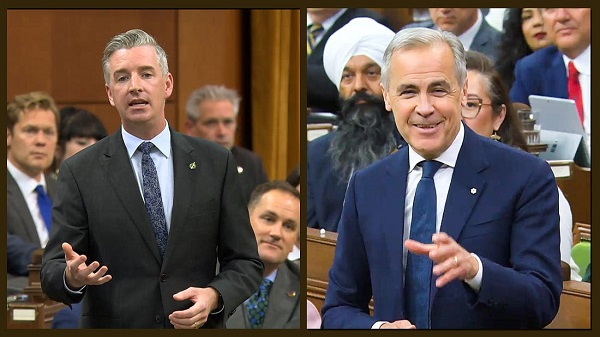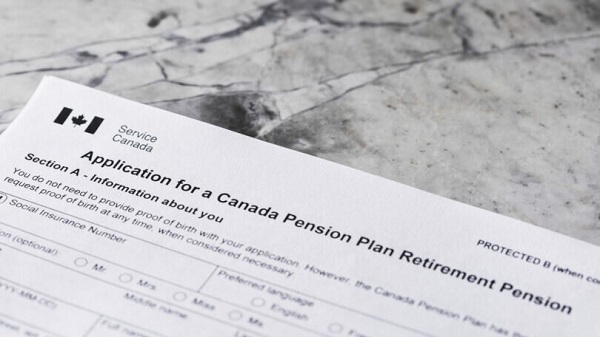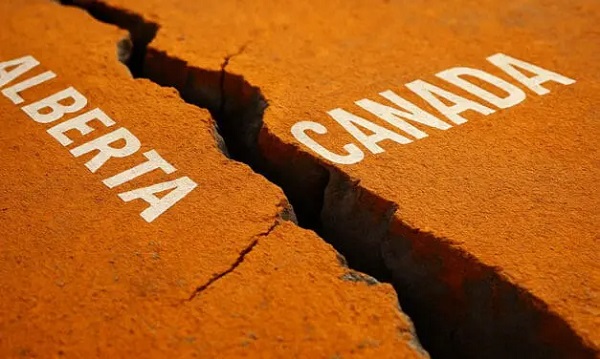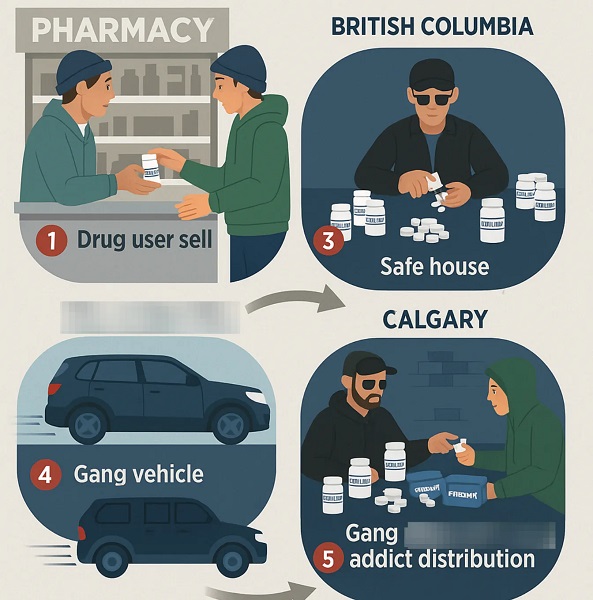National
Question Period : Barrett vs. Carney Clash Over Offshore Investments


 Dan Knight
Dan Knight
Prime Minister faces questions over blind trust and past ties to tax havens, as Conservatives demand greater financial transparency on day one of the 45th Parliament.
On the very first day of the 45th Parliament, Canadians witnessed a spectacle that was as revealing as it was disturbing. Conservative MP Michael Barrett stood up and did what any responsible representative should do: he asked Prime Minister Mark Carney to come clean about his offshore investments and potential conflicts of interest. But instead of facing the music, Carney pulled a classic elitist maneuver—he hid behind his House Leader, who delivered a canned response full of platitudes and devoid of substance.
This wasn’t just a missed opportunity for transparency; it was a calculated evasion. Carney, the former banker who helped Brookfield Asset Management establish funds in Bermuda and the Cayman Islands, is now Canada’s Prime Minister. And when pressed about whether any of his investments were previously held in tax havens, he couldn’t even muster the courage to answer for himself. Instead, he let a subordinate deflect with talk of “stringent ethics guidelines” and “economic priorities.” Meanwhile, Canadians are struggling to afford basic necessities, and they deserve to know if their leader is playing by the same rules—or any rules at all.
Barrett—one of the few people in Ottawa actually doing his job—didn’t hold back. As Shadow Minister for Ethics and Accountable Government, he called out Prime Minister Mark Carney for what appears to be a massive financial shell game. The accusation? That Carney, during his time as a high-flying executive at Brookfield Asset Management, helped funnel billions into offshore tax havens—Bermuda, the Caymans, you name it—and then conveniently tucked those assets away in a so-called “blind trust” right before stepping into public office.
Barrett’s message was simple and devastating: “Canadians are lined up at food banks in record numbers. They can’t pay their rent, but they are paying their taxes.” Meanwhile, the guy running their government may have spent years helping billionaires avoid paying theirs. Barrett demanded straight answers: Were any of Carney’s current holdings, now supposedly out of sight, previously parked in these offshore tax shelters? And what exactly was he sitting on when he walked into that first cabinet meeting?
The allegations stem from Carney’s role as chairman of Brookfield from 2020 to January 2025, where he co-chaired funds worth $25 billion registered in Bermuda and a $5 billion fund in the Cayman Islands, according to CBC News reports. These arrangements, which reportedly allowed Brookfield to avoid $5.3 billion in taxes, have drawn scrutiny amid Canada’s economic challenges, including rising food bank usage and housing affordability issues.
In response, the Liberal government House Leader defended Carney, dismissing Barrett’s questions as “hypotheticals and conjured scenarios.” “The Prime Minister has followed all the rules even before they were required,” the House Leader stated, emphasizing that Carney’s blind trust complies with Canada’s “stringent ethics guidelines.” The response pivoted to the government’s agenda, citing efforts to create “the strongest economy in the G7,” reduce taxes, and build new homes, while accusing the opposition of “digging dirt on day one.” The House Leader’s retort, “Shame on them,” drew murmurs of support from Liberal benches.
Undeterred, Barrett doubled down, arguing that Canadians “don’t want an explanation on how to bend over backwards to fit through ethical loopholes.” He called for assurance that Carney’s actions go “above just the basic minimum standard,” referencing a decade of perceived Liberal ethical lapses. “Can he stand up and assure Canadians that none of the funds he had previously were held in offshore tax havens?” Barrett asked, pressing for specifics on Carney’s financial holdings.
The Liberal response reiterated Carney’s compliance, with the House Leader asserting, “Canada has among the most stringent ethics guidelines in the world… The Prime Minister is busy creating opportunity for Canada, standing up in a trade war against the United States.” The deflection, focusing on economic priorities and dismissing the opposition’s probe as a distraction, left Barrett’s core questions unanswered, fueling Conservative claims of evasion.
This entire exchange isn’t just about one question or one day—it’s part of a much larger and very necessary effort by Conservatives to expose something Canadians are starting to see with painful clarity: Mark Carney is not one of them. He’s not scraping to make rent. He’s not standing in a food bank line. He’s not worried about carbon taxes or grocery bills. He’s a Davos man, parachuted into the Prime Minister’s Office by the same Liberal elite that gave us Justin Trudeau. Different face. Same contempt.
Barrett’s takedown of Carney over offshore tax havens hit a nerve, and rightly so. According to Canadians for Tax Fairness, this country loses a jaw-dropping $30 billion every year to offshore tax avoidance. That’s money that working Canadians pay so the elite can squirrel away their wealth in places like Bermuda and the Cayman Islands. And Carney? He helped orchestrate it. As a top dog at Brookfield Asset Management, he didn’t just benefit from the system—he helped design it. And if that wasn’t enough, under his leadership, Brookfield moved its headquarters from Toronto to New York. In the middle of growing trade tensions with President Trump’s America. That’s not leadership—it’s betrayal.
And how does Carney justify all this? With the most nauseating phrase in the English language: “It was legal.” Oh, well, as long as the loopholes were big enough to drive a luxury yacht through, I guess we’re fine. He claims these “tax-efficient” strategies helped pensioners and that his blind trust protects him from conflicts. Right. Because what better way to gain public trust than hiding your financial interests in a vault and telling voters, “Just trust me”?
Barrett and the Conservatives aren’t buying it—and neither should you. They’re calling for real reform, tougher disclosure rules, and an end to the wink-wink, nudge-nudge ethics games that the Liberals have been playing for a decade. Carney delayed his financial disclosures during his leadership run? Of course he did. That’s not transparency. That’s strategy. And Canadians know it.
Even the so-called experts are noticing the shift. One analyst noted Barrett’s attacks are landing with voters because they’re the ones who are actually suffering. Meanwhile, the Liberals want to pivot to their so-called “economic wins.” Great. Tell that to the family paying $7 for lettuce or the trucker trying to fuel his rig with gas prices through the roof.
As Parliament gets underway, we’re heading into a full-blown war over ethics and economic justice. And the question for Carney is simple: Is he going to answer for his record—or is he going to keep hiding behind the same smug Liberal arrogance that Canadians are sick and tired of?
The people are watching. The mask is off. And Mark Carney has a choice: come clean—or be dragged into the sunlight.
Subscribe to The Opposition with Dan Knight .
For the full experience, upgrade your subscription.
Banks
Canada Pension Plan becomes latest institution to drop carbon ‘net zero’ target

From LifeSiteNews
Changes to the law require companies to more rigorously prove their environmental claims.
The investment group in charge of Canada’s governmental pension plan has ditched its “net zero” mandate, joining a growing list of major institutions doing the same.
According to the Canada Pension Plan (CPP) Investments’ latest annual report, the entity is no longer committed to carbon “net-zero” by 2050. The CPP’s ditching of the target comes after a number of major institutions, including the Royal Bank of Canada (RBC), Toronto-Dominion Bank (TD), Bank of Montreal (BMO), National Bank of Canada, and the Canadian Imperial Bank of Commerce (CIBC), all made similar moves in recent months.
While ditching the net-zero effort, chief executive of CPP Investments John Graham maintained that it is still “really important to incorporate climate and incorporate sustainability” in its long-term investment portfolio.
The dropping of the “climate” target comes as recent changes to Canada’s Competition Act now mandate that companies prove any environmental claims they make, with Graham insinuating these changes were a factor in the decision.
“Recent legal developments in Canada have introduced, kind of, new considerations around how net-zero commitments are interpreted, so that’s caused us to change a little bit how we talk about it, but nothing’s changed on what we’re actually doing.”
Over the past decade, left-wing activists have used “net zero” and “environmental, social & governance” (ESG) standards to encourage major Canadian and U.S. corporations to take particular stands on political and cultural issues, notably in promotion of homosexuality, transgenderism, race relations, the environment, and abortion.
Outside of Canada, many major corporations have announced they are walking back DEI and other related policies. Some of the most notable include Lowe’s, Jack Daniel’s, and Harley Davidson. Other companies such as Disney, Target, and Bud Light have faced negative sales due to consumers fighting back and refusing to patronize the businesses.
Since taking power in 2015, the Liberal government, first under Justin Trudeau and now under Mark Carney, has continued to push a radical environmental agenda in line with those promoted by the World Economic Forum’s “Great Reset” and the United Nations’ “Sustainable Development Goals.” Part of this push includes the promotion of so called net-zero energy by as early as 2035.
Alberta
Jann Arden’s Rant Will Only Fuel Alberta’s Separation Fire

From the Frontier Centre for Public Policy
By Lee Harding
In a fiery takedown of Alberta sovereigntists, Jann Arden may have poured gas on the sovereignty fire instead of dousing it. Lee Harding argues that her vulgar swipe ignored Alberta’s raw deal in Confederation, from lopsided equalization to federal overreach, and only deepens Western alienation. Rather than shaming Albertans into silence, her outburst might push them closer to the exit.
The singer’s foul-mouthed tirade won’t shame Alberta into silence. It’ll only push the province further toward the door
Jann Arden’s recent tirade against sovereigntist Albertans will probably do more to motivate them than set them back.
In an online rant, the Calgary-born-and-raised singer lowered public discourse a few notches.
“Hey, Alberta. Hey, you bunch of fu-king separatist wackos. How you doing? Feeling good about yourselves? You’re an embarrassment to this country. Everything you have, everything that you have enjoyed, cherished and benefited from, comes from being part of one of the greatest countries on the planet.”
Ha! Arden only embarrassed herself with her rudeness and ignorance.
Canada has been milking Alberta for a long time. In a 2024 study, the Fraser Institute showed that from 2007 to 2022, Albertans contributed $244.6 billion more in taxes and other payments to the federal government than they received in federal spending, more than five times as much as British Columbians or Ontarians. The other seven provinces were net takers.
Alberta is carrying Canada’s load by doing many things right, only to get zero respect and little benefit in return. For the past 10 years, Ottawa has done everything it can to undermine the energy sector through regulation and taxation, and encroach on provincial jurisdiction through legislation. Rather than feeding and protecting the goose that lays the golden eggs, it would rather pluck out its feathers.
The imbalance is nothing new. Since Confederation, most Canadian provinces have enjoyed jurisdiction over their natural resources. However, Alberta and Saskatchewan didn’t get that until 1930. When equalization began in 1957, Alberta received payments for eight years and never again. Quebec has been paid every year.
Ottawa went the route of more taxation, programs and debt, while Alberta took a more conservative approach. Its capacity to spend rose and fell with the price of oil. Just when Alberta hit another good wave, Ottawa launched the National Energy Program in the early 1980s—just to remind them who ruled the country and to whose benefit. Alberta got reduced profits and Eastern Canadians got cheap gas.
Alberta has been stuck in an abusive relationship for a long time and is wondering if it wouldn’t be better to be on her own. In the background is another suitor named Donald Trump, who would relieve Alberta of those pesky equalization payments and onerous regulations. The province would become the “cherished 51st state” instead of some western challenger to Central Canadian dominance that always needs to be put in its place.
Arden can’t see any of this. And her vitriol does nothing to make Albertans want to stay.
“You guys have your head so far up your as-es that you obviously can’t see what pri-ks you are,” Arden ranted. “The way you are treating your fellow citizens, your fellow Canadians, you guys are a bunch of creepy little pri-ks…
“Alberta will never separate from Canada. It’s never going to happen because people like me are going to stand up, throw their shoulders back, and keep fu-king yelling and keep standing up for what I know is right.”
Oh? Should Albertans stay because an insulting singer inspires a screaming mob? Will they suddenly find gratitude?
No. Abused Albertans have had enough. Their wants are not only reasonable, they’re good and fair policy. Canadians and their federal government should treat Alberta with proper respect, care about its grievances and feelings, and appreciate how they’d be a whole lot worse without her.
Lee Harding is a research fellow for the Frontier Centre for Public Policy.
-

 Addictions5 hours ago
Addictions5 hours agoMan jailed for trafficking diverted safer supply drugs, sparking fresh debate over B.C. drug policies
-

 Alberta7 hours ago
Alberta7 hours agoHow Trump and Alberta might just save Canada
-

 Bruce Dowbiggin2 hours ago
Bruce Dowbiggin2 hours agoCaitlin Clark Has Been The Real Deal. So Her WNBA Rivals Hate Her
-

 Business6 hours ago
Business6 hours agoThe Liberals Finally Show Up to Work in 2025
-

 Banks3 hours ago
Banks3 hours agoCanada Pension Plan becomes latest institution to drop carbon ‘net zero’ target
-

 Alberta5 hours ago
Alberta5 hours agoJann Arden’s Rant Will Only Fuel Alberta’s Separation Fire
-

 Daily Caller4 hours ago
Daily Caller4 hours agoThere’s A Catch To California’s Rosy Population Stats
-

 Crime2 days ago
Crime2 days ago“A Dangerous Experiment”: Doctor Says Ideological Canadian Governments Ignored Evidence as Safer Supply Exacerbated Fentanyl Death Surge



